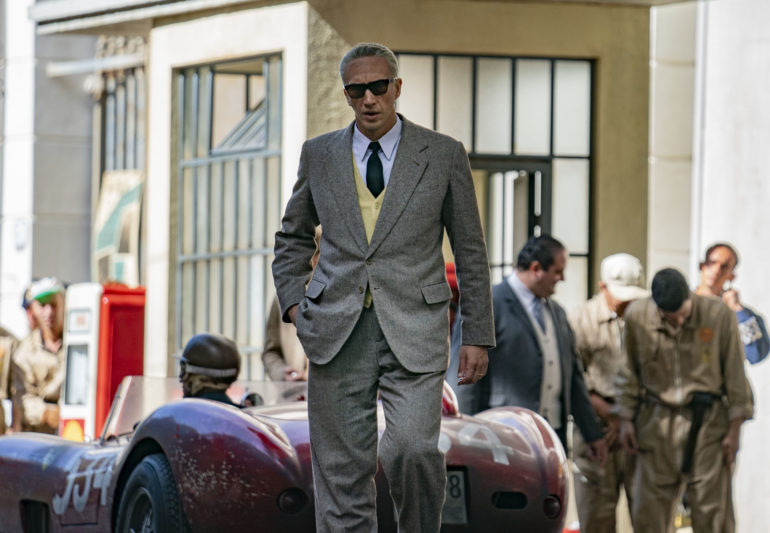A name like Ferrari demands something special. It is less a brand or a name than a symbol of a lifestyle most can only imagine. Enzo Ferrari (1898 – 1988) was an innovator in the world of motor racing. To tell his life story onscreen, you could do far worse than Michael Mann. Not for the first time, Mann is working with the familiar formula of the biopic, but with Ferrari, he proves yet again that familiarity needn’t breed contempt. Mann has had considerable success with true stories before (The Insider is still one of his most acclaimed works, and Ali transcends the biopic tropes through that handheld digital Mann style that was his mainstay through to Blackhat), and he’s clearly invested enough in this story to have executive produced the story of Ferrari’s American arch rivals in Ford vs. Ferrari. As with his previous true stories, Mann keeps the focus on the subject, using his clinical but stylish eye to bring out what’s going on behind those sharp suits.
After House of Gucci, we should be wary of Adam Driver playing another Italian, but this particular Italian offers just the kind of material Mann loves. Whether Hanna and McAuley, Jeffrey Wigand or John Dillinger, Mann wants to use the machinery of film to break down the walls that gifted-but-complicated men build up around themselves. It’s 1957, a pivotal time in Ferrari’s life; he’d just lost his young son to illness, and his company was in dire need of refinancing. In adapting Brock Yates’ biography of Ferrari, Mann and co-writer Troy Kennedy Martin aim for specificity in timeframe, while still acknowledging the man’s life as a whole. This approach is reminiscent of another recent biopic, but Ferrari is relatively straightforward compared to Christopher Nolan’s Oppenheimer. The focus on 1957 shows us a man attempting to reinvent himself in the face of too many pressures.
Ferrari is attempting to live many lives at once. As one-time Grand Prix champion, and founder-owner of Ferrari S.p.A., the man known as ‘Il Commendatore’ watches as Maserati and Jaguar threaten to take his cars’ records, their prestige, and their sales. Meanwhile, he’s building a relationship with his mistress Lina (Shailene Woodley) and their young son, while trying to maintain some status quo with his estranged wife Laura (Penélope Cruz). The complications of this man’s life are laid down in the first fifteen minutes of Ferrari, and it’s efficient to a fault. For a while, Ferrari feels too conventional, especially for Mann. Besides some expository dialogue, the cinematography isn’t what we’re used to from him either. Gone is the grainy digital of Miami Vice or Blackhat; instead, DoP Erik Messerschmidt (Mank, The Killer) gives us gorgeous dappled sunlight covering the rolling hills of Emilia-Romagna. It might as well be sunny, because Ferrari’s story is anything but.
If the film’s prologue suggests conventionality, the rest of Ferrari settles down into something more specific, as Ferrari himself sets his eyes on what needs to be done to ensure his company’s survival. More sales are needed, and more race wins are the way to do it. The nuts and bolts (literal and otherwise) of Ferrari’s business are the most intriguing part of the film. His passion for racing and his business are insatiable, even when test failures and even driver deaths threaten to derail his ambitions. There is a pragmatic cruelty to Ferrari, and full credit to Driver and the script for not overlooking it. In his performance, Driver portrays Ferrari as practical, almost stoic. Despite some moments of temper, Driver infuses Ferrari with an imperviousness that someone with global name recognition would need. He’s a fine lead, with solid supports all around him, but Cruz is the star turn here. Laura could have become a nominal villain in this story, obstructing her husband’s ambitions and dreams with her risk-averse business sense and increasing isolation from him. In Cruz’s hands, however, she’s as much a victim of Enzo’s ego as anyone else here. Cruz reminds us that being a victim needn’t mean being passive, and she’s magnificent. But what of Mann? Has his abandonment of grainy digital and closer adherence to expectations of biopics dulled his voice? Not for a moment. There is a balletic kineticism to Ferrari, and not just in the race scenes. The camera follows the characters as if waiting to hear what they have to say, with dynamic editing in scenes of dialogue ensuring we’re held rapt. As for the race scenes themselves, they boast ambition and crunch. Gorgeous Italian landscapes, aerial photography and CGI combine to make these sequences fast, tense and (in one notable scene) visceral. Like his contemporary and fellow octogenarian Martin Scorsese, Mann shows no sign of slowing up or scaling down. His methodology has softened (Blackhat’s paranoia and tech-spiel alienate may have broken his heart and his wallet beyond repair), but Ferrari can sit comfortably alongside Mann’s other professionally lonely men.

